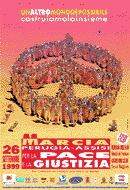
March for peace Perugia Assisi 1999
The institutions listen to us
by Elisabetta ProiettiBack to index
"We must bear in mind that the appeals launched by the Assembly of the Peoples are echoing even there, in the halls of the Governments." This is not only the hope and the profound reason behind all sorts of commitment for peace and justice, but also the exact words pronounced by Senator Patrizia Toia, the under-secretary of the Italian Ministry for Foreign Affairs, during her speech on the first day of the Assembly. While emphasising the need for international legality and democracy, the Senator highlighted the effectiveness of civil society action.
In this respect, she cited the campaign against anti-personnel mines, which was granted the Nobel Prize: "Everything started from civil society commitment and it finally arrived at the drafting of a treaty". The role of NGOs, associations and local authorities is crucial: they are not only useful in order to correct the behaviour of governments and institutions, but they also point at problems and spur official bodies to take action. "You are giving us much impulse. No institution is annoyed with your presence. Indeed, our positions stimulate one another". And this is a Senator's word.
"Even if the present facts have pushed us to cancel some rules, some rules will be established anyway. The system of human rights is not a system of good intentions and utopian idealism. It is a system of regulations to be implemented in real places". These should be based on the awareness of two major principles: universality, which is the capacity to welcome and communicate with different realities, and mutual dependence of problems and rights.
Protection of rights and globalisation
According to the President of the Italian Chamber of Deputies, Mr Luciano
Violante, "In the globalisation era, there is more violence than we had
during the Cold War: at that time, there were some balances, however
oppressive and terror driven."
There is more violence, starting from the ferocious one of economics, the mother of all the others.
So, how can we put the defence of human rights to the fore of a globalised world? How can we make the values of humanity and peace global? Mr Violante's proposal is to establish, next to human rights, the Universal Duties of States: today, it's the states that inflict the worst types of violence. "They must include few points, but fundamental". "Otherwise, interventionism is wrong and there is a risk to adopt arbitrary measures: it is unclear why one should intervene somewhere, maybe in a place where one has precise interests, and not somewhere else."
If a new interpretation of international law is not proposed, globalisation may well become an alibi, one more issue to be handled by few hands. "National interest has been the father of all wars" said Mr Violante "Today, we need to change perspective: there is no national interest for just one state. We need to develop relationships between states, in order for interests to become collective."